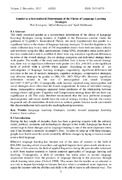| dc.description.abstract | The study examined gender as a sociocultural determinant of the choice of Language
Learning Strategies among learners of English in the Tanzanian context. Under the
guidance of Vygotsky’s Sociocultural Theory, the study hypothesized that gender is a
significant factor in the choice of language learning strategies. To test this hypothesis, the
study collected data from a total of 530 respondents drawn from both secondary schools
and university using the SILL questionnaire. Using SPSS, descriptive mean scores and ttest was conducted to test to establish if there were any statistical significant differences
in terms of the overall strategy, the six strategy categories and individual strategy items
with gender. The results of the study indicated that: first, in terms of the overall strategy
use, there was no significant difference with gender (t=1.824, p<0.185) at the significant
level of p≤0.05 with a df=508 while gender. According to the results of six
subcategories of language learning strategies respectively, significant differences did
not exist in the use of memory strategies, cognitive strategies, compensation strategies,
and affective strategies by gender (t=.904,.926, .9671.315,p>.05). However, significant
differences existed in the use of metacognitive and social strategies
(t=3.469*,3.365*,p<.05). Consequently, male learners reported using metacognitive and
social strategies more often than did female respondents. In terms of individual strategy
items, metacognitive strategies appeared better predictors of the relationship between
strategy choice and gender. Cognitive and Compensation strategy items did not show any
significance at all. The study therefore recommends that the most preferred strategies
(metacognitive and social) should form the core of strategy training. Second, the society
in general and all stakeholders should strive to achieve gender balance inside and outside
the classroom/lecture halls and in the teaching/learning resources. | en_US |

